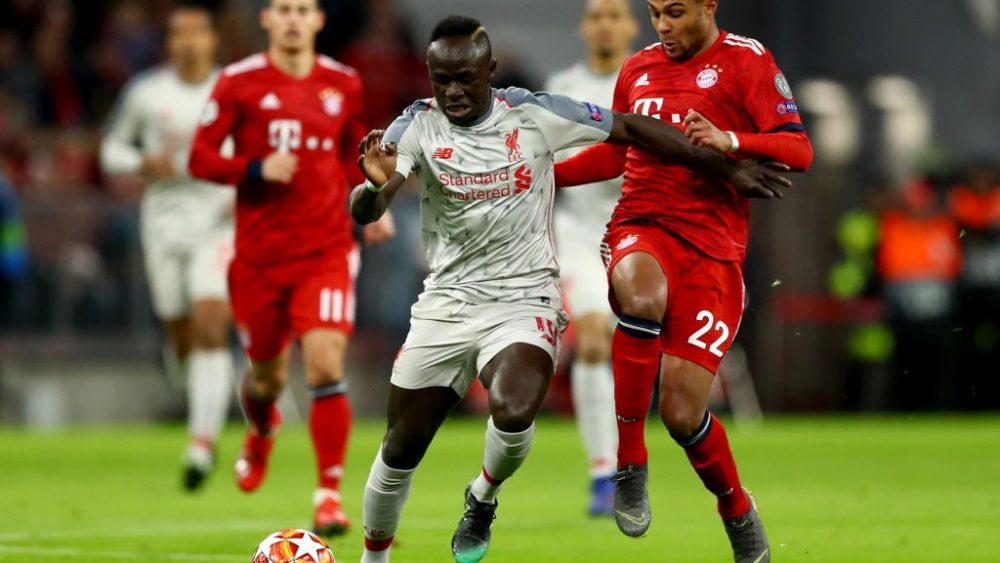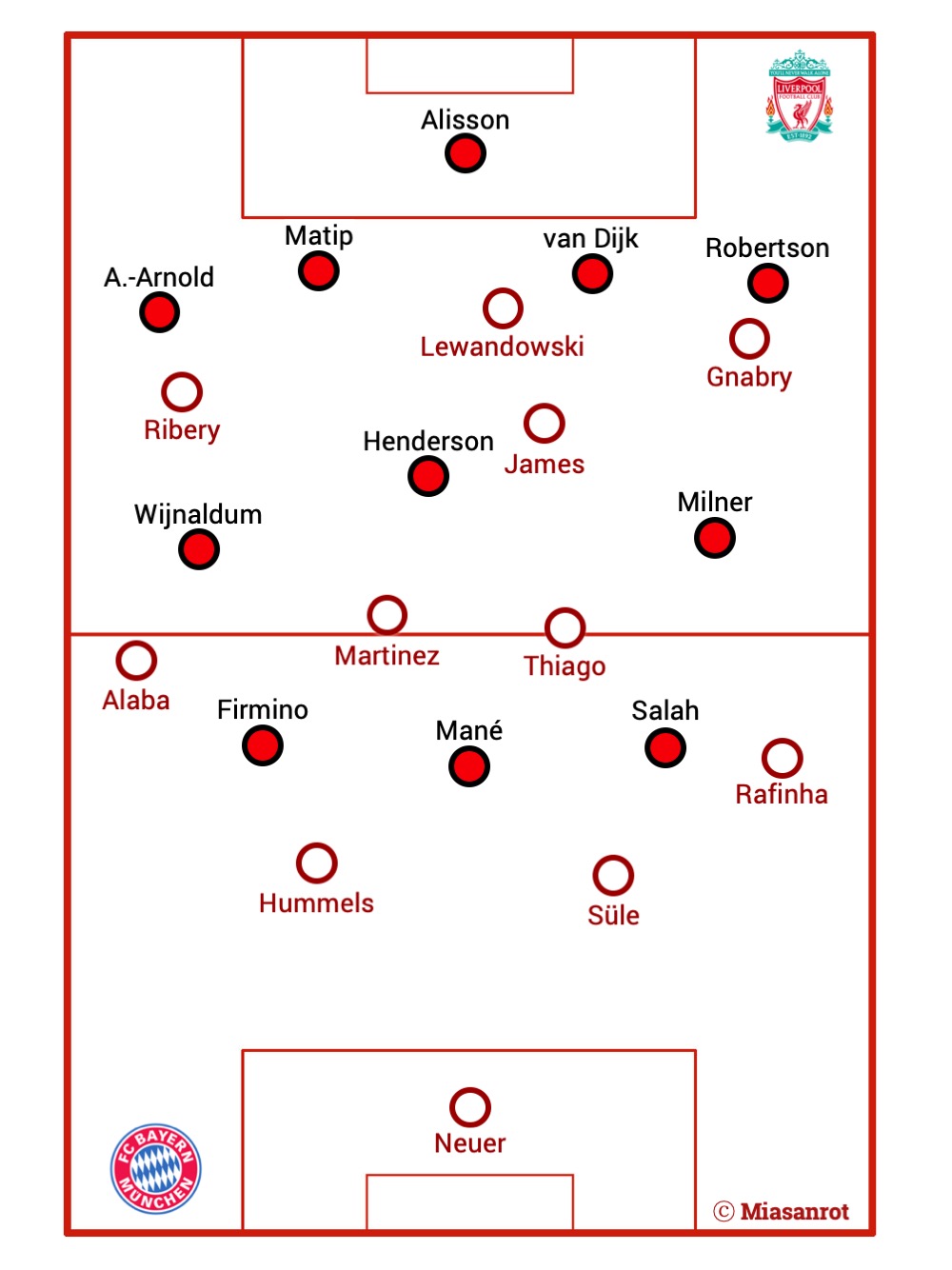Game of my life #14: Jürgen Klopp strikes back, the end of an era for Bayern?
Article written by Manuel.
The Situation before the game
It had been a difficult first half of a season for Bayern Munich under head coach Niko Kovač. Kovač took over the club that summer from Jupp Heynckes but oversaw a difficult start of the season that included a winless series over the duration of the Oktoberfest.
Borussia Dortmund, in the meantime, dominated the first half of the season and built up a significant gap to Bayern. Slowly but surely, it became apparent that Bayern’s golden generation, built around wingers Franck Ribéry and Arjen Robben, was coming to a close.
Sure, the club still had its moments. Bayern played brilliantly against Borussia Dortmund on Nov. 10, 2018. But ultimately, the Rekordmeister would lose the game 3-2. The overall sense was that Bayern were still capable of special moments but that the squad could no longer consistently provide the sort of football the team was known for under Jupp Heynckes and Pep Guardiola.
By the winter break, the club tried to make corrections by signing Lucas Hernández from Atlético Madrid to strengthen the defense and Callum Hudson-Odoi to add a spark to the attack. Furthermore, President Uli Hoeneß, CEO Karl-Heinz Rummenigge, and the sporting director kept underlining that this was a transition year for the club.
Ultimately, Bayern failed to sign both targets that winter—although Hernández would join the club in the summer (more on that below). Then there were the ongoing debates on whether Kovač was the right man for the rebuild; his style of play was not always a good fit for the side it seemed. Also, players did not always follow the coach to the same level as it was the case at Eintracht Frankfurt.
For Bayern, however, the great leveler is always the Champions League. Drawn against Jürgen Klopp’s Liverpool in the round of 16 of the competition, there was a sense that this would be the great test on what Kovač could get out of the side against the very best teams in world football.
The first leg indicated that Bayern were still a team on par with the best in the world. Keeping the tie close, the Rekordmeister managed a 0-0 draw at Anfield. It was a good result on paper and should have given the club a good chance to advance to the next round of the competition.
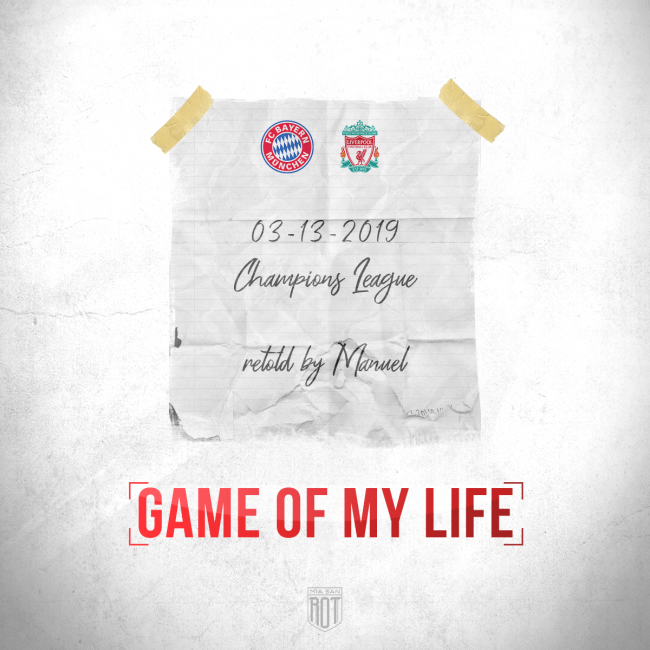
In Case You Missed It
The Starting lineups
Bayern started in a classical 4-2-3-1 formation. Thiago and Javi Martínez in midfield and James Rodríguez behind Lewandowski were supposed to bring much needed midfield stability – in theory. Martínez, in particular, had been immense in the first leg. But although Serge Gnabry started on the right, Franck Ribéry and James in the attacking-trident behind Lewandowski meant that Bayern never managed to develop enough speed to truly threaten Liverpool’s counter-pressing system. The midfield three was also very static. Kovač should have known better, his very own Eintracht Frankfurt successfully counter-pressed itself to the DFB Pokal final against a Bayern side that included James, Javi Martínez and Thiago in midfield…
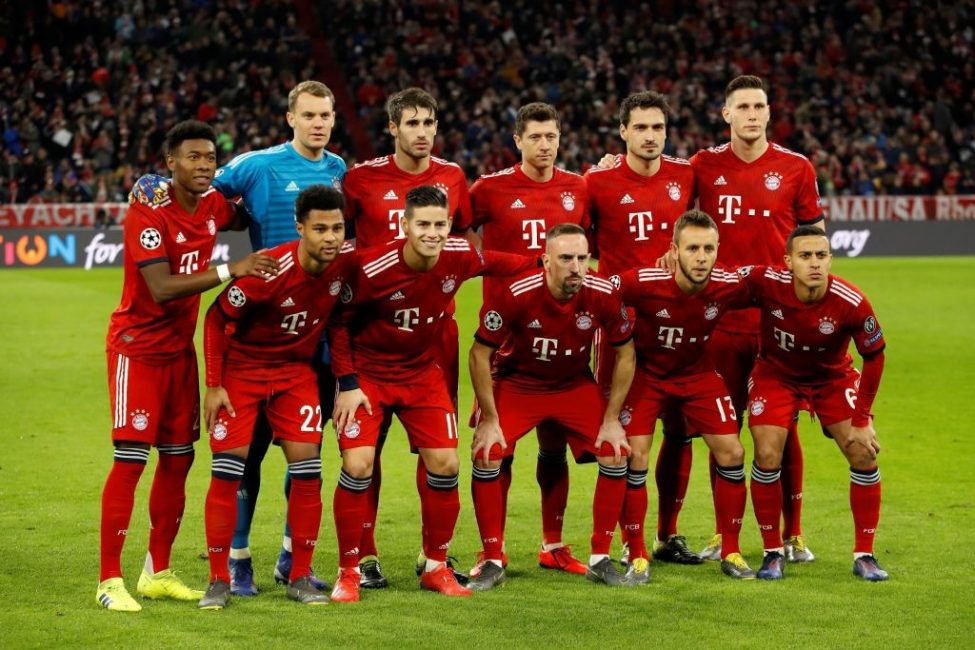
(Image: Odd Andersen/AFP via Getty Images)
The first half
It was not meant to be, however. Both sides needed to win, a nil-nil scoreline would have sent the game into overtime. With this in mind, both Jürgen Klopp and Niko Kovac emphasized the need for balance ahead of the game. Kovač, in particular, was set on a more defensive approach. Attack must be backed by a resolute defensive approach, Kovač kept telling the press, an approach that had an impact on the early stages of the game. The opening 13 minutes were a balancing act—a tactical game of chess, with neither side opting to really test the other. The visitors were dealt an early blow—captain Jordan Henderson was forced to leave the field with a muscle injury. Klopp, however, had been gifted with a deep squad and brought on Brazilian holding midfielder Fabinho to replace Henderson.
Bayern had the greater share of possession in the game’s early stages. The figure read 70% as the twenty-minute mark ticked past, but still, there was no genuine attempt on target from either side. Just five minutes later that changed as Roberto Firmino unleashed a shot from 20 yards that had Manuel Neuer scrambling for his far post—the Reds from Liverpool had drawn first blood. Neuer, in particular, would be the main protagonist that evening. Just moments after the shot from Firmino, Virgil van Dijk showed his class with a great ball to Sadio Mane, who embarrassed the German national team keeper to score Liverpool’s crucial away goal.
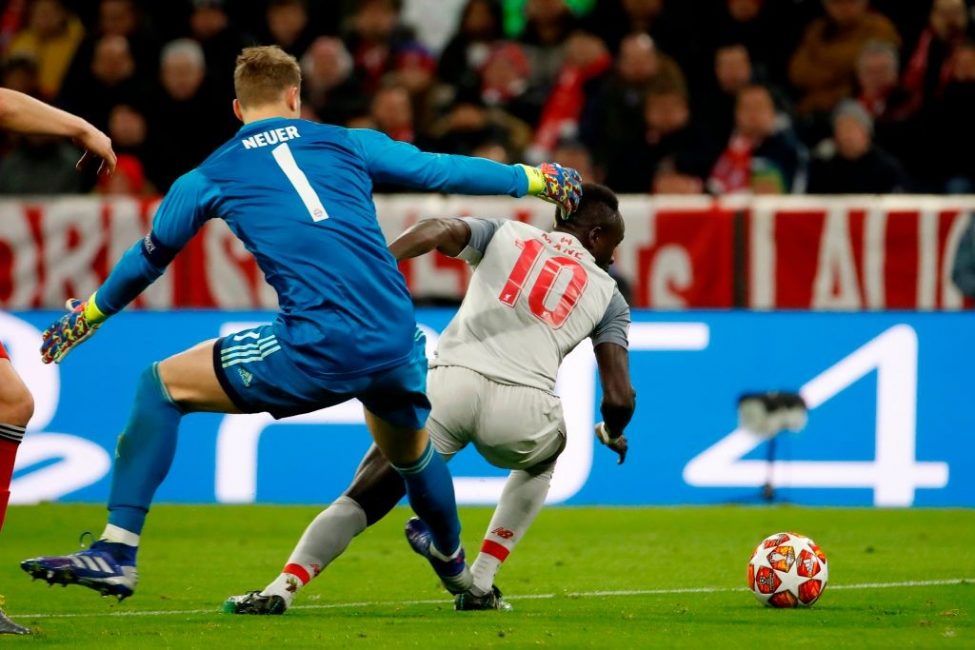
(Image: Odd Andersen/AFP via Getty Images)
The Reds were not done with one; they pushed for more. James Milner forced a save from Neuer after 35 minutes, jeers and whistles filled the Allianz, the home fans expected better from the Rekordmeister. With just under 10 minutes left of the half, the Südkurve got their wish. Bayern broke quickly, and a panicked Joël Matip turned a Serge Gnabry opportunity past his keeper. Two mistakes now defined the first half.
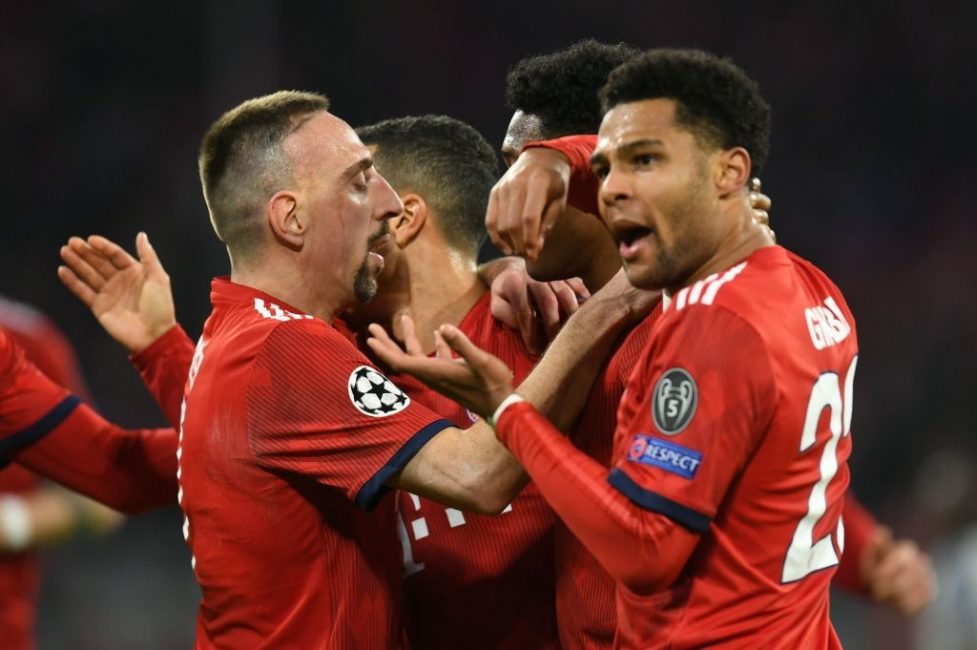
(Image: Christof Stache/AFP via Getty Images)
The second half
The second half started in the same vein as the first had ended. Both teams attacked. Bayern forced their third corner of the evening on 47 minutes, Liverpool immediately hit them on the counter. Kovač knew of the dangers that Klopp’s side posed from counter-attacking positions. “We can’t sit back and defend without any plan,” Kovač said before the game. We have to get into the match rhythm, and we know Liverpool are the strongest team in transitional play.”
Nonetheless, it was the visitor’s transition that threatened Bayern the most; the Bavarians knew that they had to press for a second, but at what cost would it come? Bayern began to fight for every ball, James Rodriguez and Robert Lewandowski, especially. The desire was there, but the final ball was lacking, as proven by Gnabry on the hour mark, he broke clear of the Liverpool backline, his ball could only flash across the box, evading all those who had sprinted to reach it.
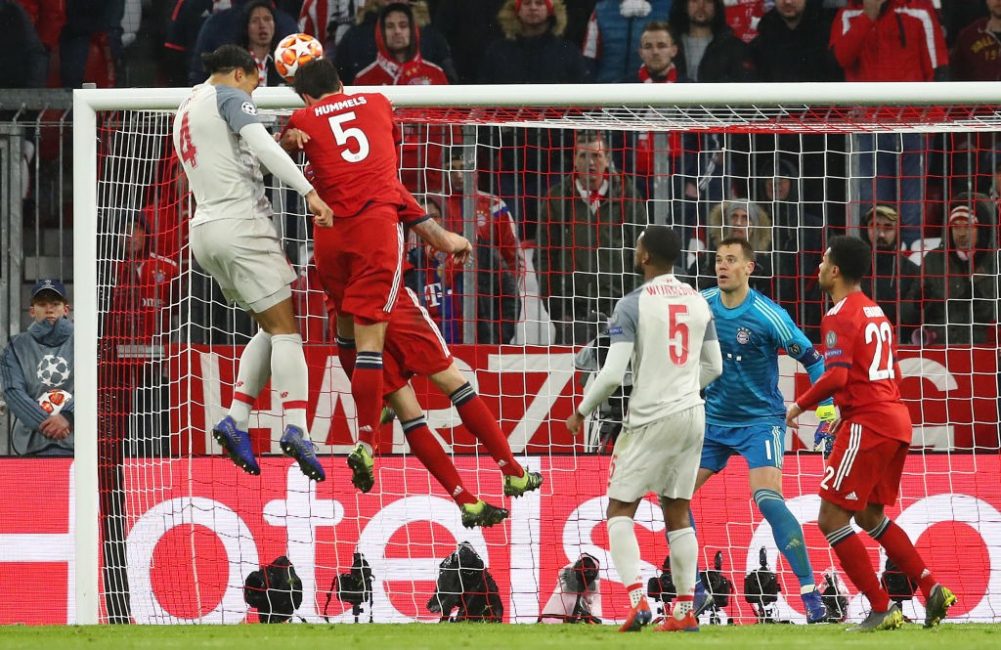
(Image: Lars Baron/Bongarts/Getty Images)
As the match moved into its final stages, the balance was teetering towards Liverpool. Just as the hosts got a foothold, Liverpool struck. James Milner delivered a wonderful cross that Virgil van Dijk powered home with his head. Bayern were beaten, but the game was not done. Bayern tried to find a way through, but Liverpool pressed harder, Divock Origi picked out Mohamed Salah, the Egyptian then whipped in a cross that Mane converted to make the tie safe.
Things that caught our eye
The reactions by the players were especially telling. After the game, Robert Lewandowski, for example, would complain about the lack of attacking philosophy set out by the coach. “We played too defensively,” Lewandowski said after the game. “We didn’t risk enough playing forward. When you look at both games, then we didn’t have many chances. For that reason, we didn’t have the arguments to advance,” Lewandowski concluded.
“In the end, we didn’t develop any pressure, we were not active, played too passive in a home game against one of the best teams in the world,” Mats Hummels said. Süle, in the meantime, emphasized the importance of form but also that the match plan simply did not work as planned. “Fundamentally, we lacked potency to break Liverpool down in both games,” captain Manuel Neuer said after the game.
The reactions by the players were telling. They felt that the team lacked the proper tactics to challenge a side like Liverpool. But there was also a general sense that Bayern simply lacked the quality of a side of Liverpool’s calibre too. In the first leg, the Rekordmeister kept the pace thanks only to a very static approach, destructive rather than the attacking football practiced under Guardiola and Heynckes.
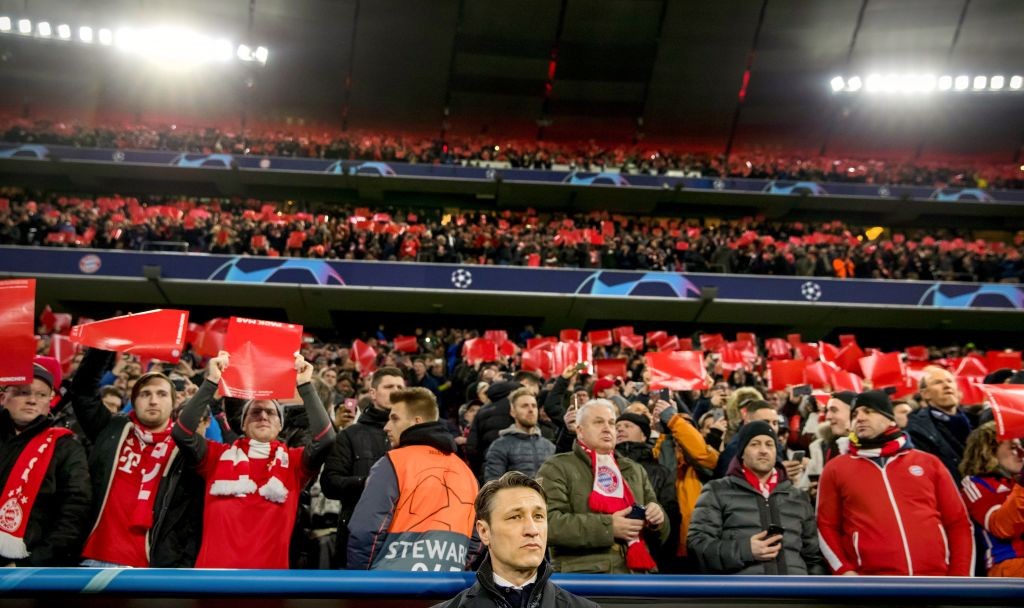
(Image: ODD ANDERSEN/AFP via Getty Images)
It was the sort of football that made Kovač a successful coach at Eintracht Frankfurt. But high-work rate counter-pressing football might work in Frankfurt with a young side. For Bayern, it was a fundamentally different approach, an approach that was not accepted by the players and also led to debates in the front-office. Ultimately, from the Liverpool game onwards, Kovač was a coach on borrowed time at the club.
What The Game Meant For The Development Of The Club
Niko Kovač managed to salvage the season, securing first the seventh Meisterschale in a row for Bayern and then the DFB Pokal in an attractive final against RB Leipzig. Those two titles made it pretty much impossible for the club to sack Kovač, even though rumours about the impending end of the coach persisted even after the Pokal victory in Berlin.
The club, however, decided to go into the 2019/20 season with Kovač in charge. Defenders Lucas Hernández and Benjamin Pavard were added to strengthen the defence. Upfront the club tried to sign Leroy Sané from Manchester City. By all accounts, a signing was very close but postponed after Sané tore his ACL in the Community Shield defeat to Liverpool. Instead, Bayern signed Philippe Coutinho on loan from Barcelona and Ivan Perišić on loan from Inter Milan.
Overall, the side still seemed very much in transition, and Kovač continued to struggle to put all the right pieces together. Despite his new lease on life at the club, there was always a sense that his philosophy and coaching style was never accepted by the squad. Furthermore, statements by Kovač, comparing his side to Liverpool and pointing out the gap of spending between the two sides did not help his cause. The rift became ever more apparent, and Kovač was finally sacked after a 5-1 defeat to Eintracht Frankfurt.
It was perhaps a turning point. Under interim coach Hansi Flick Bayern have shown signs that they are returning to their old playing philosophy. The Liverpool game in that sense could be described as a turning point. Bayern reached at least the semi-final of the Champions League in seven of the last ten years. It is a remarkable record, the Liverpool result, however, shows that the club is in dire need of internal renewal and a head coach that can once again install a proper football philosophy that truly embodies the “Mia San Mia” attitude of the club.

